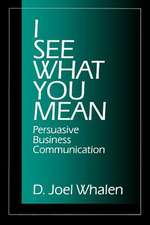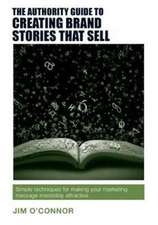The Professional Communications Toolkit
Autor D . Joel Whalenen Limba Engleză Paperback – 13 feb 2007
• Provides a dynamic modern approach: Includes a vivid conceptualization of the exact nature of business communication - what it is and how to do it well in the 21st Century
• Avoids academic tone and jargon: Written to be accessible and make the material come alive for students
• Offers a chapter on visual tools for communication: Step-by-step instructions are given for building high-impact PowerPoint slides, mastering e-mail communication, and leaving clear voice mail messages
• Enhances discussion of managing speech anxiety: The causes, symptoms, and methods for managing anxiety, including mind-body techniques, are thoroughly examined
• Includes a special article on performance anxiety: A contribution from Corey Goldstein, M.D., a nationally recognized expert on performance anxiety, offers additional help and techniques for managing debilitating anxiety
Preț: 845.06 lei
Preț vechi: 1030.56 lei
-18% Nou
Puncte Express: 1268
Preț estimativ în valută:
161.69€ • 169.73$ • 134.21£
161.69€ • 169.73$ • 134.21£
Carte tipărită la comandă
Livrare economică 10-24 aprilie
Preluare comenzi: 021 569.72.76
Specificații
ISBN-13: 9781412927161
ISBN-10: 1412927161
Pagini: 304
Ilustrații: illustrations
Dimensiuni: 178 x 254 x 16 mm
Greutate: 0.53 kg
Ediția:Second.
Editura: SAGE Publications
Colecția Sage Publications, Inc
Locul publicării:Thousand Oaks, United States
ISBN-10: 1412927161
Pagini: 304
Ilustrații: illustrations
Dimensiuni: 178 x 254 x 16 mm
Greutate: 0.53 kg
Ediția:Second.
Editura: SAGE Publications
Colecția Sage Publications, Inc
Locul publicării:Thousand Oaks, United States
Cuprins
Preface
Why Communication Is Import
Little Help From Science
So You Think You're Not Understood?
Acknowledgments
Chapter 1: Effective Communication: 'It's Not About You'
What Kind of Communication Do You Need?
'Checklist Communication'--Best Done Quickly
'Convincing Communication'--Requires More Preparation
Dominant and Subordinate Roles
Simultaneous Feedback
How the Message You Send Gets Meaning
Leadership: Communicating Your Vision
Seek to Share Understanding
'Felt Sense': Your Body Knows
Monkey See, Monkey Communicate--'Mirror Neurons'
Chapter 1 Summary
Key Ideas
Chapter 2: Message Strategies - What to Speak and What to Write: 'Attitude in 90% of Speaking'
Power of Speaking: Oral Communication
The Essence of Communication: Meaning
Poor Communication Teaching
Before You Speak, Set Your Attitude
Speaking Delivers Less Content
Nonverbal Communication
When You Talk, You Show How You Feel
During Great Communication, You Disappear
Here's What Great Attitude Feels Like
Most Motivating Emotion = Enthusiasm
Communication Toolbox
Telephone and Voicemail Techniques
First Rule: You're Introducing--Ask for Permission to Speak
Telephone: Your've Lost 55 Percent of Your Ability to Create Meaning
Visualize Your Listener--Imagine Your Unseen Listener
When to Leave Your Name and Number
Chapter 2 Summary
Key Ideas
'Communicator's Checklist'
Chapter 3: The Power and Limitations of Speaking
Miscommunication Is Common
What to Write/What to Say?
The Power of Speaking
What Was Rememered and What Was Forgotten
Your "Self" Was Formed Over Time
Some Brain Patterns Are On-Board at Birth
Brain Programmed Through Sensory Information
Secret Behind Using Sense Memory
Sensory Preference--'Different Senses for Different People'
Symbols
The Basic Element of Communication: The Sign
Theatre of the Mind
Types of Symbols
Denotative Symbols
Connotative Symbols
Persuasive Messages Contain Both Denotative and Connotative Symbols
Contextual Meaning
Color
Lines
Space
Subtle Symbols: Power and Confidence
Touch
Smells
Emotions and Fear
Persuading Angry People
Handling Angry Supervisors and Customers
Using Fear to Persuade
Fear Messages Can Backfire--Watch Out: "Fear Appeals Must Be Handled Carefully'
'Buyers' Four Big Fears'
The Professional Loser
Persuasion Ethics
Chapter 3 Summary
Key Ideas
'Communicator's Checklist'
Chapter 4: When You're Afraid to Communicate: 'Understanding Anxiety and Fear'
Why Must You Manage Your Speech Anxiety?
If You Never Get Communication Anxiety, You're a Rare Bird
Communication Anxiety: Silent Enemy of Success
Americans' Greatest Phopias
When It's Your Turn to Speak, Do You Get These Symptoms?
When You'll Get It
Strategies When You're Not a 'Master of the Message'
Communication Toolbox
The Thinking Person's Approach: Understanding the Psychophysiology of Anxiety
Anxiety Manufacturing Plant: Your Brain Stem
Chapter 4 Summanry
Key Ideas
'Communicator's Checklist'
Chapter 5: Managing Communication Anxiety: 'Action Steps You Can Take'
Action Steps You Can Take
Some Anxiety Is Good
Decide: Is It Fear or Excitement?
Don't Try to Be Cool--You Won't Look Confident
Idle Your Engine
Be Here Now
'Square Breathing'
'Calm Down Breathing'
Stretch Away Your Tension
How to Build a List of 'Personal Power Thoughts'
Taking Control of Persistent Fears
False Alarms Go Off in Your Head
Your Brain Stem Is Obsessed With Fear
The Deer-in-the-Headlights Look
Communication Toolbox
Dealing With Balnking Out
Two Different Speed Zones--Yours and the Audience's
Blanking Out Under Pressure
Know More About How Your Mind Works: 'Attribution of Cause'
How to Use the Power of Attribution Theory to Manage Speech Anxiety
Seven Keys to Managing: Communication Anxiety
Advanced Fear Management
Getting More Help
Medical Management by Corey Goldstein, M.D.
What to Do When communication Anxiety is Overwhelming
Non-pill Relief
A Pill May Help
Medications That Ease Communication Anxiety
Help Is Available
Chapter 5 Summary
Key Ideas
'Communicator's Checklist'
Chapter 6: Making People Believe You: 'Persuasive Communication'
First, People Must Believe You--Managing Your Credibility
Source Credibility
You've Got to Answer Your Listeners' Unasked Questions
Credibility and the Team Player
Ancient Greeks' Secrets of Credibility
'Three Pillars of Credibility': Expertise, Trustworthiness, and Goodwill
The Four Component of Credibility
Fluid presentation--Another Type of Dynamism
Credibility From the Audience's Eyes
Attribution Theory and Credibility
Put Your Credibility to Work
Credibility Builders: Some Tricks of the Trade
'Wingman' Technique
'Wingman' in the Sales Call
You're a Product
'Wingman' in Job Interviews
The Single Most Effective Political commercial
Warning: High Credibility Can Backfire on the Professional
When High Credibility Can Kill You
Credibility and the Business Professional
Chapter 6 summary
Key Ideas
'Communicator's Checklist'
Chapter 7: Message Packaging - Strategies for Formatting Presentations: 'How You Say It'
Opening the Presentation
The 'Question Opening'
'Einstein's Time Shift'
The Power of Brainwashing
How to Structure Your Presentation With Questions
A Classic Presentation Format--'Tell'Em'
The 'Cold Closing'
No 'Thank You' Allowed
Warning: Don't Ask for Questions
A Perfect Strategy: The 'Nichols's Two-Things' Presentation
Write Your Presentation in Five Minutes
The Final Format--Presenting as a Tem Member
Benefits of Team Presentations
Specialty Roles
The 'Hand-Off'
'Wingman' in Team Presentations
Communication Toolbox
'Communicator's Checklist'
Opening the Presentation
The 'Question Opening'--Four Steps
Checklist for Successfully Executing the 'Question Opening'
'Cold Closing' Checklist
Specialist Checklist
Chapter 7 Summary
Key Ideas
Chapter 8: Message Delivery - 'Performing the Presentation'
You're in Showbiz--Entertain 'Em
Power of Selective Attention
Fight Back--Work to Refresh Their Attention Frequently
Before You Are Introduced, See If Your Audience Has a Pulse
Prepare for the Disaster That Will Never Come
Let Your Body Speak for You
Projecting Your Attitude to Your Audience
Take Charge of the Room
Business Presentations Are Not Storytelling
Business Presentations Versus Social Presentations
Presenting PowerPoint Slides
'Turn, Touch, & Tell'
Presenting Graphs
Communication Toolbox
Ten Tips and Rules for Persuasive Presentations
Handling the Audience's Questions
Voice Control
Chapter 8 Summary
Key Ideas
'Communicator's Checklist'
Chapter 9: Writing E-mails and Memos With High Communication Factor
Busy People Scan
Stop Sending Out Rough Drafts
Advantage to Written Communication
Three Ideas to Get Your E-mails and Memos Read
Idea One--Use Typeface and White Space
Why People Like Sans Serif
Pick Proportional Type
Don't Use Reverse Typeface
White Space Directs the Eye
Idea Two-Prep Your Reader's Brain
Bullets--When Should You Use Bullets?
Bullet FAQs
Communication Toolbox
E-mail Techniques
Starting Your E-mail--What to Write First
Subject Lines
Essential Elements
Idea Three--Motivate Your Reader to Read
Memo Writing Rules
Writing With High Communication Factor
Common Grammatical Errors
Editing Tips
Writing of Motivation Sentence
Chapter 9 Summary
Key Ideas
'Communicator's Checklist'
Chapter 10: Communicating With Tables, Graphs, and Charts: 'Your Visual Toolbox'
Tables
Graphs--Pictures, Not Words
How to Make Tables and Graphs
Making Pretty Pie Charts
Making Highly Readable Graphs
Graph Building Techniques
To 3-D or Not to 3-D? That Is the Question
Graphs That Deceive
Models--Perceptual Maps
Choose Your Software Carefully
Chapter 10 Summary
Key Ideas
'Communicator's Checklist'
Chapter 11: Maximum PowerPoint
Type Size
Typestyle
Kepp Punctuation to a Minimum
How Much Information to Put on a Slide
Communicating With Color
Presenting With Visuals
When to Hand Out Materials
Sample Presentation Visuals
Bullets Are Great--Use Them
Chapter 11 Summary
Key Ideas
'Communicator's Checklist'
Demonstration PowerPoint Slide Editing
Text Slides
On Graphs
Appendix: If You'd Like to Learn More
Recommended Reading
Take These Training Courses
References
Index
About the Authors
Why Communication Is Import
Little Help From Science
So You Think You're Not Understood?
Acknowledgments
Chapter 1: Effective Communication: 'It's Not About You'
What Kind of Communication Do You Need?
'Checklist Communication'--Best Done Quickly
'Convincing Communication'--Requires More Preparation
Dominant and Subordinate Roles
Simultaneous Feedback
How the Message You Send Gets Meaning
Leadership: Communicating Your Vision
Seek to Share Understanding
'Felt Sense': Your Body Knows
Monkey See, Monkey Communicate--'Mirror Neurons'
Chapter 1 Summary
Key Ideas
Chapter 2: Message Strategies - What to Speak and What to Write: 'Attitude in 90% of Speaking'
Power of Speaking: Oral Communication
The Essence of Communication: Meaning
Poor Communication Teaching
Before You Speak, Set Your Attitude
Speaking Delivers Less Content
Nonverbal Communication
When You Talk, You Show How You Feel
During Great Communication, You Disappear
Here's What Great Attitude Feels Like
Most Motivating Emotion = Enthusiasm
Communication Toolbox
Telephone and Voicemail Techniques
First Rule: You're Introducing--Ask for Permission to Speak
Telephone: Your've Lost 55 Percent of Your Ability to Create Meaning
Visualize Your Listener--Imagine Your Unseen Listener
When to Leave Your Name and Number
Chapter 2 Summary
Key Ideas
'Communicator's Checklist'
Chapter 3: The Power and Limitations of Speaking
Miscommunication Is Common
What to Write/What to Say?
The Power of Speaking
What Was Rememered and What Was Forgotten
Your "Self" Was Formed Over Time
Some Brain Patterns Are On-Board at Birth
Brain Programmed Through Sensory Information
Secret Behind Using Sense Memory
Sensory Preference--'Different Senses for Different People'
Symbols
The Basic Element of Communication: The Sign
Theatre of the Mind
Types of Symbols
Denotative Symbols
Connotative Symbols
Persuasive Messages Contain Both Denotative and Connotative Symbols
Contextual Meaning
Color
Lines
Space
Subtle Symbols: Power and Confidence
Touch
Smells
Emotions and Fear
Persuading Angry People
Handling Angry Supervisors and Customers
Using Fear to Persuade
Fear Messages Can Backfire--Watch Out: "Fear Appeals Must Be Handled Carefully'
'Buyers' Four Big Fears'
The Professional Loser
Persuasion Ethics
Chapter 3 Summary
Key Ideas
'Communicator's Checklist'
Chapter 4: When You're Afraid to Communicate: 'Understanding Anxiety and Fear'
Why Must You Manage Your Speech Anxiety?
If You Never Get Communication Anxiety, You're a Rare Bird
Communication Anxiety: Silent Enemy of Success
Americans' Greatest Phopias
When It's Your Turn to Speak, Do You Get These Symptoms?
When You'll Get It
Strategies When You're Not a 'Master of the Message'
Communication Toolbox
The Thinking Person's Approach: Understanding the Psychophysiology of Anxiety
Anxiety Manufacturing Plant: Your Brain Stem
Chapter 4 Summanry
Key Ideas
'Communicator's Checklist'
Chapter 5: Managing Communication Anxiety: 'Action Steps You Can Take'
Action Steps You Can Take
Some Anxiety Is Good
Decide: Is It Fear or Excitement?
Don't Try to Be Cool--You Won't Look Confident
Idle Your Engine
Be Here Now
'Square Breathing'
'Calm Down Breathing'
Stretch Away Your Tension
How to Build a List of 'Personal Power Thoughts'
Taking Control of Persistent Fears
False Alarms Go Off in Your Head
Your Brain Stem Is Obsessed With Fear
The Deer-in-the-Headlights Look
Communication Toolbox
Dealing With Balnking Out
Two Different Speed Zones--Yours and the Audience's
Blanking Out Under Pressure
Know More About How Your Mind Works: 'Attribution of Cause'
How to Use the Power of Attribution Theory to Manage Speech Anxiety
Seven Keys to Managing: Communication Anxiety
Advanced Fear Management
Getting More Help
Medical Management by Corey Goldstein, M.D.
What to Do When communication Anxiety is Overwhelming
Non-pill Relief
A Pill May Help
Medications That Ease Communication Anxiety
Help Is Available
Chapter 5 Summary
Key Ideas
'Communicator's Checklist'
Chapter 6: Making People Believe You: 'Persuasive Communication'
First, People Must Believe You--Managing Your Credibility
Source Credibility
You've Got to Answer Your Listeners' Unasked Questions
Credibility and the Team Player
Ancient Greeks' Secrets of Credibility
'Three Pillars of Credibility': Expertise, Trustworthiness, and Goodwill
The Four Component of Credibility
Fluid presentation--Another Type of Dynamism
Credibility From the Audience's Eyes
Attribution Theory and Credibility
Put Your Credibility to Work
Credibility Builders: Some Tricks of the Trade
'Wingman' Technique
'Wingman' in the Sales Call
You're a Product
'Wingman' in Job Interviews
The Single Most Effective Political commercial
Warning: High Credibility Can Backfire on the Professional
When High Credibility Can Kill You
Credibility and the Business Professional
Chapter 6 summary
Key Ideas
'Communicator's Checklist'
Chapter 7: Message Packaging - Strategies for Formatting Presentations: 'How You Say It'
Opening the Presentation
The 'Question Opening'
'Einstein's Time Shift'
The Power of Brainwashing
How to Structure Your Presentation With Questions
A Classic Presentation Format--'Tell'Em'
The 'Cold Closing'
No 'Thank You' Allowed
Warning: Don't Ask for Questions
A Perfect Strategy: The 'Nichols's Two-Things' Presentation
Write Your Presentation in Five Minutes
The Final Format--Presenting as a Tem Member
Benefits of Team Presentations
Specialty Roles
The 'Hand-Off'
'Wingman' in Team Presentations
Communication Toolbox
'Communicator's Checklist'
Opening the Presentation
The 'Question Opening'--Four Steps
Checklist for Successfully Executing the 'Question Opening'
'Cold Closing' Checklist
Specialist Checklist
Chapter 7 Summary
Key Ideas
Chapter 8: Message Delivery - 'Performing the Presentation'
You're in Showbiz--Entertain 'Em
Power of Selective Attention
Fight Back--Work to Refresh Their Attention Frequently
Before You Are Introduced, See If Your Audience Has a Pulse
Prepare for the Disaster That Will Never Come
Let Your Body Speak for You
Projecting Your Attitude to Your Audience
Take Charge of the Room
Business Presentations Are Not Storytelling
Business Presentations Versus Social Presentations
Presenting PowerPoint Slides
'Turn, Touch, & Tell'
Presenting Graphs
Communication Toolbox
Ten Tips and Rules for Persuasive Presentations
Handling the Audience's Questions
Voice Control
Chapter 8 Summary
Key Ideas
'Communicator's Checklist'
Chapter 9: Writing E-mails and Memos With High Communication Factor
Busy People Scan
Stop Sending Out Rough Drafts
Advantage to Written Communication
Three Ideas to Get Your E-mails and Memos Read
Idea One--Use Typeface and White Space
Why People Like Sans Serif
Pick Proportional Type
Don't Use Reverse Typeface
White Space Directs the Eye
Idea Two-Prep Your Reader's Brain
Bullets--When Should You Use Bullets?
Bullet FAQs
Communication Toolbox
E-mail Techniques
Starting Your E-mail--What to Write First
Subject Lines
Essential Elements
Idea Three--Motivate Your Reader to Read
Memo Writing Rules
Writing With High Communication Factor
Common Grammatical Errors
Editing Tips
Writing of Motivation Sentence
Chapter 9 Summary
Key Ideas
'Communicator's Checklist'
Chapter 10: Communicating With Tables, Graphs, and Charts: 'Your Visual Toolbox'
Tables
Graphs--Pictures, Not Words
How to Make Tables and Graphs
Making Pretty Pie Charts
Making Highly Readable Graphs
Graph Building Techniques
To 3-D or Not to 3-D? That Is the Question
Graphs That Deceive
Models--Perceptual Maps
Choose Your Software Carefully
Chapter 10 Summary
Key Ideas
'Communicator's Checklist'
Chapter 11: Maximum PowerPoint
Type Size
Typestyle
Kepp Punctuation to a Minimum
How Much Information to Put on a Slide
Communicating With Color
Presenting With Visuals
When to Hand Out Materials
Sample Presentation Visuals
Bullets Are Great--Use Them
Chapter 11 Summary
Key Ideas
'Communicator's Checklist'
Demonstration PowerPoint Slide Editing
Text Slides
On Graphs
Appendix: If You'd Like to Learn More
Recommended Reading
Take These Training Courses
References
Index
About the Authors
Notă biografică
Joel Whalen is Academic Director of the Kellstadt Center Sales Leadership Program at Chicagös DePaul University (since 1986). He is an Associate Professor of Marketing and holds a Ph.D. in Marketing Communications (Florida State University `86). Dr. Whalen has been listed by Whös Who in America and Men of Distinction, Cambridge, England. He is a Sales and Sales Management Fellow of the American Marketing Association. The Ernst & Young Entrepreneurship Foundation named him Entrepreneur of the Year, and he is a member of the Entrepreneur Hall of Fame. Joel has received numerous awards for outstanding teaching. After 10 years of study, experimentation, and innovation, in cooperation with companies, associations, and thousands of DePaul students, Joel discovered the core psychological, attitudinal, and behavioral drivers behind effective, professional communication. He created a series of exercises that have helped people become more masterful communicators. In workshops and classes throughout the U.S., Australia, and Thailand, Dr. Whalen gives thousands of people the tools they need. Dr. Whalen has an extensive background in sales and advertising. As a salesperson and sales manager, he consistently set all-time sales records. Joel has received numerous advertising awards for creative television and radio commercials, including an award for one of the first television commercials created by a computer. In Florida politics, Whalen was communications advisor to several successful, statewide political campaigns.
Dr. Whalen is the author of I See What You Mean, Sage Publications.
He has published articles in:
Psychology & Marketing
Journal of Business Research
Journal of Business Ethics
Design Management Journal
Journal of Educational & Psychological Measurement
Journal of Promotions Management
Joel has been interviewed by national and international press including:l
CBS
NBC
ABC
PBS
NPR¿s Marketplace
Advertising Age
Atlanta Constitution
Chicago Tribune
Chicago Sun Times
Christian Science Monitor
Financial Times of London
Playboy
Time
The Australian Broadcasting Company (ABC)
Dr. Whalen is the author of I See What You Mean, Sage Publications.
He has published articles in:
Psychology & Marketing
Journal of Business Research
Journal of Business Ethics
Design Management Journal
Journal of Educational & Psychological Measurement
Journal of Promotions Management
Joel has been interviewed by national and international press including:l
CBS
NBC
ABC
PBS
NPR¿s Marketplace
Advertising Age
Atlanta Constitution
Chicago Tribune
Chicago Sun Times
Christian Science Monitor
Financial Times of London
Playboy
Time
The Australian Broadcasting Company (ABC)
Descriere
The Professional Communications Toolkit presents a compelling vision of communication that offers little known and amazingly effective techniques for the novice speaker and stage-savvy pro alike. Author D. Joel Whalen provides practical, research-based tools that apply perfectly to all professional communication, whether it's one-on-one conversations, speaking at small staff meetings, or delivering a keynote address to a ballroom full of people.







